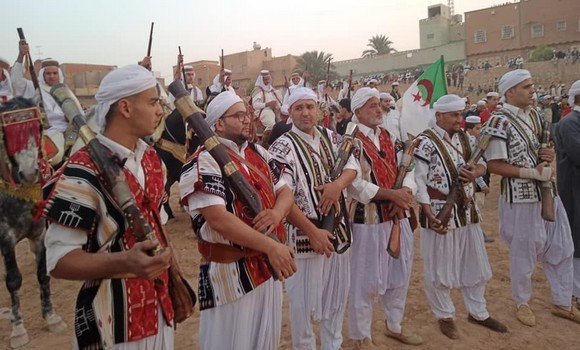GHARDAIA – Far from being an evanescent ritual in our history, the celebration of Yennayer (Amazigh New Year) is part of the traditions of all Algerians and continues, with Amazigh-speaking families in M’zab, to mark time as a festival always alive with its ritual practices, its colors and its culinary traditions.
This ritual differs from one region to another, and in Ghardaïa for example, this festival is prepared at the beginning of January by children, women and men, taking into account the strict measures to be observed.
Celebrated in the singularity of the ancestral traditions of the region on the night of January 6 to 7, the Amazigh New Year in M’zab follows a tradition linked to agricultural activities and resources essential to peasant life.
It marks the start of the winter season and the agrarian year in this arid climate region.
The difference in the date of celebration of Yennayer in this region, unlike others where it is celebrated on January 12, still remains a mystery and no source has been able to shed light on the enigmatic date of January 6 to 7 (Yennayer) in the M’zab.
However, everyone agrees that the Amazigh New Year refers to the agricultural calendar, says retired teacher Salah Tirichine.
For the inhabitants of the oases of M’zab, this event, which coincides with the end of the harvesting of phœnicicultural production, is a crucial step in reviewing the environmental situation of the palm groves and announcing the start of the care and grooming operation. productive date palms, told APS Hadj Bakir, owner of a palm grove in Ghardaïa.
The purpose of the operation is to cut with a sharp saw or an ax the dry palms, slash and other dead shrubs, the growth of suckers, the lif and the remains of the flower stalks, in order to allow the soil to retain the moisture and nutrients but also reduce the risk of fire, he explained.
The grooming operation also affects the séguias and other irrigation water sharing networks in palm groves, said this connoisseur of seasonal agricultural work.
For Dr. Ahmed Nouh, notable of Béni-Isguen, this day of the Amazigh New Year, which presages a fruitful new year, also constitutes for the fairer sex of M’zab an opportunity to discuss the situation of women, in particular the new brides.
“Each family offers a dish (the famous R’fis) to the new bride and the women advise each other on the life of the couple, the children and inquire about the situation of widows and divorcees, in a climate of solidarity”, Mr. Nouh specified.
These rituals, which draw their historical resilience from the attachment of the inhabitants of M’zab to their ancestral culture and consolidate social cohesion and solidarity, vary between the desire to attract blessings, ensure a good year and keep away the bad luck.
Each year, Yennayer is celebrated in the manner of ancestors, with the same fervor, the same meditation and all the usual ceremonial around the special dishes carefully prepared for the evening of the Amazigh New Year and which must contain only white ingredients (sugar , semolina, milk, etc.), so that the New Year is said to be a year of peace and happiness.
A celebration that augurs well for a prosperous agricultural year
R’fis, a local dish, essential during the celebration of the Amazigh New Year, is prepared mainly with semolina, sugar, milk and eggs, which the housewife cooks in the form of a pancake which is crumbled and steamed. .
Soaked in smen (natural animal fat) and decorated with raisins and hard-boiled eggs, this dish brings together the whole extended family, and is punctuated by a prayer followed by the reading of the verse of the Fatiha from the Holy Quran to implore God to to make this new year, considered the start of the agricultural season, a good year for agriculture and hydraulics.
Yennayer’s evening with Amazigh-speaking families in M’zab ends in a ritual atmosphere with games called Alaoune, a kind of Algerian Bouqala.
Other special and equally hearty dishes are also prepared on this occasion such as Chercham, Chekhchoukha or Couscous, consumed collectively in the same dish and this even in Arabic-speaking localities of Ghardaia, reported Ahmed Benseghir, a researcher from the University. de Laghouat, specifying that in all cases, it is a rich and auspicious meal, presaging a fruitful new year.
Yennayer is thus part of the rehabilitation of Amazigh culture, heritage, values and traditions, which are an integral part of national culture in all its diversity and plurality.
Several festive ceremonies have been programmed by associations in the different structures of the wilaya of Ghardaïa, to inculcate and teach young generations and civil society the ancestral culture of Algeria in all its diversity, indicated the initiators of these festivities. which end with prayers by imploring Allah to water us in beneficial rains to fill the water tables and the wells of the course in order to fight against the drought.






